Kristine Hughes's Blog, page 114
February 6, 2013
Pride & Prejudice Anniversary Merchandise
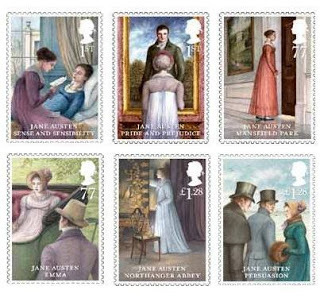 Commemorative stamps issued by the Royal Mail will be available starting February 21st.
Commemorative stamps issued by the Royal Mail will be available starting February 21st. 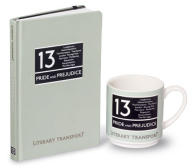
Pride and Prejudice anniversary Journal and Mug from BBC America.
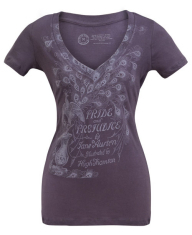
Pride and Prejudice T-shirt, BBC America
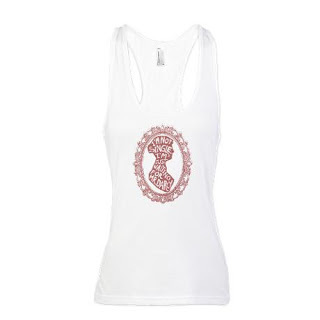
T-shirt - I'm not single, I'm just waiting for Mr. Darcy
 Pemberley
Pemberley 
iPhone 5 case
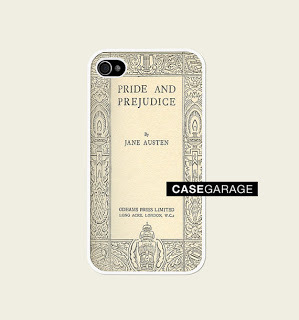
iPhone 4 case

Tall, Dark and Darcy tote
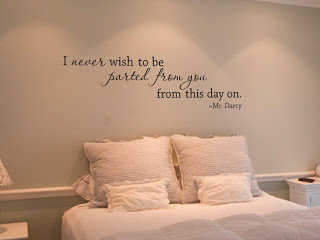
Darcy quote vinyl wall decal

Elizabeth and Darcy bookends/shelf pillows
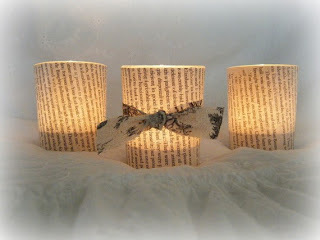
Set of 3 Pride and Prejudice votive candles
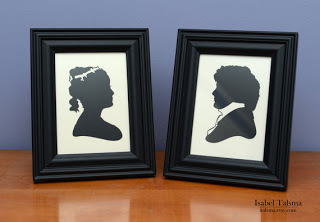
Handcut paper silhouettes
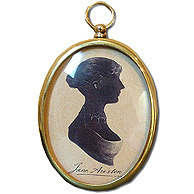
Jane Austen Silhouette
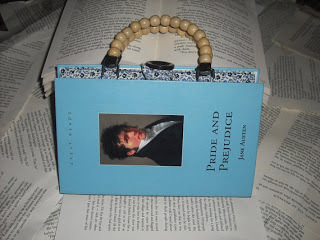
Book purse
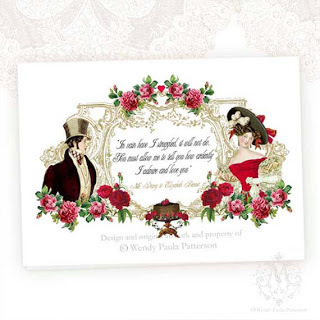 Valentine Cards
Valentine Cards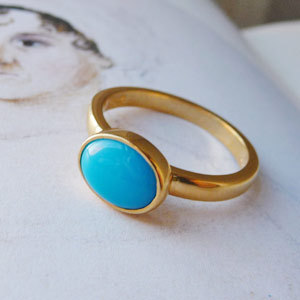
Jane Austen reproduction ring
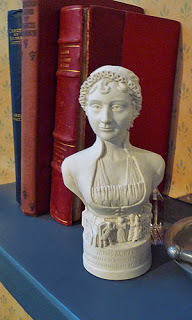
Jane Austen gypsum plaster bust
Published on February 06, 2013 00:00
February 4, 2013
A Couple In England - Day Two - Part Three
After my Mayfair Stroll, I returned to the hotel in order to get properly dressed. The Hubby, but this time, was awake, but still in bed.
"You look comfy."
"I am comfy," he agreed, using the remote control in order flip through the UK television channels.
"Do you want to do something? Go out for a bit? I want to do a few things on Piccadilly."
"Hon," he began, looking at me properly, "Go and do whatever it is your heart desires. Really. I'll be just fine here."
"You're going to stay in the room? In London?"
"I'm perfectly happy here. I'm not at work, so this is a vacation for me. Look, your idea of a vacation is different than mine. We both enjoy laying on the beach. We both enjoy a cruise. We don't both enjoy walking around London from morning till night. Go. I'll be just fine."
"You won't mind if I don't come back for a few hours?"
"Just be back in time for dinner."
By this time, I'd not only gotten properly dressed (an actual outfit in which all pieces were meant to be worn together, at the same time) and put my make up on. Finished, I put my coat on and I grabbed my purse.
Walking to the door, I hesitated. "Caffe Nero is just at the corner, as you know, and two doors down from that is Tesco Express. Oh, and there's a Marks and Spencer Just Food a block down on Piccadilly. And Shepard's Market behind us, where they have pubs and restaurants."
"Go. Have fun. I promise not to have starved by the time you get back."
Needing no further prompting, I scurried out the door and was soon at the corner of Half Moon Street and Piccadilly, where Fanny Burney/Madame D'Arblay lived.
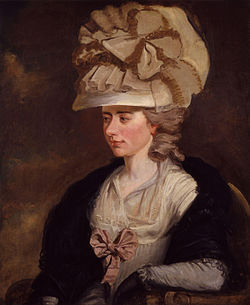
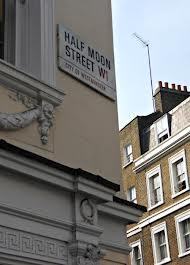
I headed down (up?) Piccadilly towards the Green Park tube station . . . .
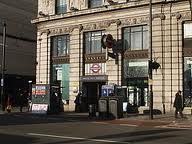
. . . . . . and headed for St. James's Church as I wanted to take some time to contemplate Mrs. Delaney's grave, located inside. Unfortunately, the church was locked up tight.
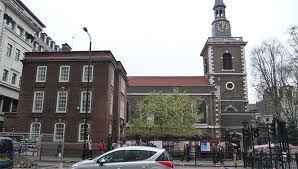
So, I walked back the way I had come until I reached Hatchard's bookshop.
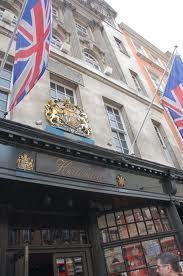
Since I had no timepiece on me, I didn't check what time I entered the shop and so I can't tell you with any accuracy how much time I spent inside, but I can safely say that it was two hours, at the very least. My favorite bookstores, hands down, are the antiquarian variety. Oh, to be able to browse the stacks and the piles of dusty tomes, arranged higgedly piggedly, never knowing what treasures are awaiting discovery. I have brought home suitcases full of used and antiquarian books after every one of my visits to England but, alas, it's now becoming more difficult for me to find titles I don't already own. Of course, there are thousands of titles I don't yet own . . . . . but for the sake of sanity and space I've imposed restrictions on additions to my research library - the Duke of Wellington, Queen Victoria, George IV, Georgian, Regency and Victorian diaries and letters and a few more obscure areas of London interest. Next to an antiquarian bookstore, give me Hatchard's - three floors of bibliophilic bliss conveniently located on Piccadilly, where it has stood since 1797. The contents of the shop, however, are decidedly 21st century. Here are just a few of the books I bought:
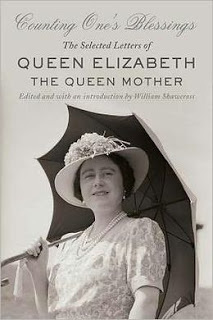
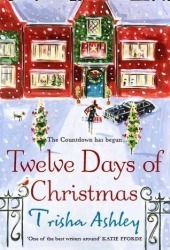
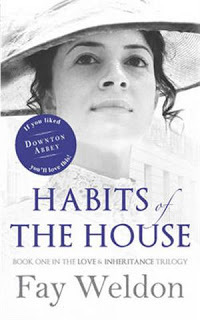
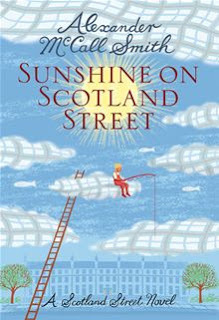
Being now both older and wiser, I had the clerk ship the books to my home, instead of having Hubby lug them around England over the next few day. Besides, this way he'd have no idea that I'd just spent several hundred pounds on reading material.
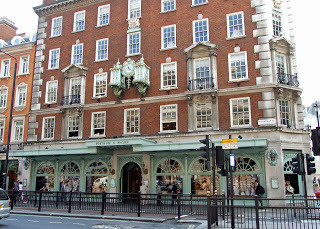
My very next stop was Fortnum and Mason, only a few doors down the street from Hatchard's. Whenever I'm in London around Christmas, I like to stop in and buy my Christmas cards for the following year. Upstairs I went, only to find the entire holiday section already decimated! There was not a single box of cards remaining - and this was just the day after Boxing Day. Crushed, I headed over to browse the hats and purses, before making my way back downstairs to the food court, where I poked about for a bit before realizing that I was, in fact, famished.
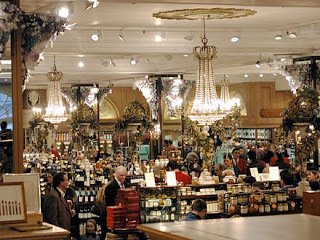 Fortnum's has at least three restaurants in which one may eat anything from an omlette to foie gras, including the Diamond Jubilee Tea Salon, but being a creature of habit when in London, I headed outside and a few doors down the street to Richoux Tea Rooms.
Fortnum's has at least three restaurants in which one may eat anything from an omlette to foie gras, including the Diamond Jubilee Tea Salon, but being a creature of habit when in London, I headed outside and a few doors down the street to Richoux Tea Rooms. 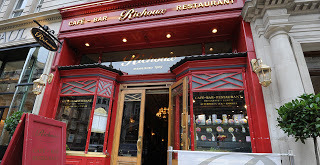
Typically, Richoux is an island of calm where one can order a civilized dish of tea and rest up between stops at the varied emporiums of Mayfair.
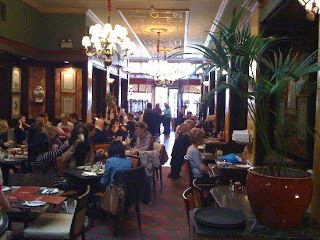
Alas, this was not to be . . . . after ordering my cream tea and pulling out a book to read, I could not help but overhear the conversation of the two gentlemen sitting next to me. A pair of Cockneys who were, obviously, brothers, it seems they chose Richoux in which to meet in order to catch up and regale one another with their opinions on various subjects, including inflation - "Old dad's overcoat would cost you six thousand pounds to have made up today." One of these men took himself to be a world traveler, who unfortunately made easy with his opinions on various places and people - "Switzerland's not bad, especially Zurich, but the Jews are such dodgy geezers." Now, I typically don't go in for butting into other people's conversations, and I refrained this time, but I did treat the pair to a raised eyebrow. Not that it mattered a wit to either of them, for the same brother went on, "Of course the Germans aren't like us, but they're awright." I asked for the check and left before he could continue on to the Japanese, the Belgians, the French or the Armenians. Gas bag . . . . . . I decided to head back to the hotel, making a pit stop in the Burlington Arcade in order window shop and appreciate the architecture.
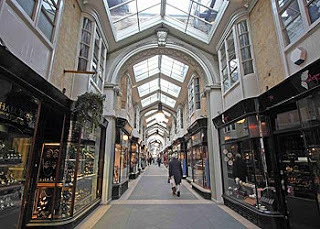
My next stop was Boots Pharmacy, where I stocked up on all the essentials one can't handily get in the States - their No. 7 skincare line and industrial strength hairspray, amongst other trifles. Then I headed up Clarges Street towards the Tesco Express, but I was brought up short when I passed a place called Burger and Lobster. Looking in the window, I saw tables filled with people chowing down on platters of lobster. Delicious looking lobster. There was a bit of a line at the door, but I finally got inside and asked the gentleman at the podium if I might see a menu. What ho! This was just the sort of place the Hubby would appreciate. I was told that there was no menu - they only served three things, to wit burgers, lobsters and lobster rolls. Genius! When I asked if I could make a reservation, I learned that not only are they a restaurant with no menues, they're also a restaurant that doesn't take reservations. First come, first served, I was told. I began to wonder whether or not they had waiters or if one had to bring their own apron and tray . . . . . . On I trudged to Tesco Express, where I purchased essentials for the hotel room in the form of a good sized bottle of rum and a six pack of Coke. I'll leave you here and will pick up Part Four soon. I must say, I can't believe that I managed to cram enough into a single day in London to warrant four parts to this post, but looking back on the itineraries that Victoria and I typically set for ourselves, this agenda was a cake walk. And time does fly when one is having fun . . . . . . . .
Published on February 04, 2013 00:00
February 2, 2013
The Strange Story of Elizabeth Woodcock
Narrative of the Sufferings of Elizabeth Woodcock
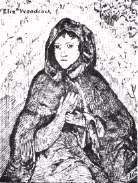
From A Selection of Curious Articles from the Gentleman's Magazine, edited by John Walker (1819) ELIZABETH WOODCOCK, aged forty-two years, went on horseback from Impington to Cambridge, on Saturday, being market day, the 2d of February, 1799. On her return home in the evening, between six and seven o'clock, being about half a mile from her own bouse, her horse started at a sudden light, which proceeded, most probably, from a meteor, a phenomenon which, at this season of the year, not unfrequently happens. She was herself struck with the light, and exclaimed "Good God! what can this be!" It was a very inclement stormy night, a bleak wind blew boisterously from the N.E. The ground was covered by the great quantities of snow that had fallen during the day, yet it was not spread uniformly over the surface. The deepest ditches were many of them completely filled up, whilst in the open fields there was but a thin covering; but in the roads and lanes, and many narrow and inclosed parts, it had accumulated to a considerable depth, no where yet so as to render the way impassable, but still enough to retard and impede the traveller. The horse, upon his starting, ran backward, and approached to the brink of a ditch, which the poor woman recollected, and, fearing lest the animal in his fright should plunge into it, very prudently dismounted with all expedition. Her intention was to walk, and lead the horse home; but he started again, and broke from her. She repeated her attempt to take hold of the bridle; but the horse, still under the impression of fear, turned suddenly out of the road, and directed his steps to the right over the common field. She followed him, in hopes of quickly overtaking him, but, unfortunately, she lost one of her shoes in the snow. She was already wearied with the exertion she had made, and besides, had a heavy basket on her arm, containing several articles of domestic consumption, which she had brought from market. By these means her pursuit of the horse was greatly impeded; she however persisted, and followed him through an opening in a hedge, a little beyond which she overtook him (about a quarter of a mile from the place where she alighted,) and, taking hold of the bridle, made another attempt to lead him home. But she had not re-traced her steps farther than a thicket, which lies contiguous to the said hedge, when she found herself so much fatigued and exhausted, her hands and feet, particularly her left foot, which was without a shoe, so very much benumbed, that she was unable to proceed farther. Sitting down then upon the ground in this state, and letting go the bridle, "Tinker," she said, calling the horse by his name, "I am too much tired to go any farther, you must go home without me;" and exclaimed, "Lord have mercy upon me! what will become of me!" The ground on which she sat was upon a level with the common field, close under the thicket on the South West. She well knew the situation of it, and what was its distance from and bearing with respect to her own house. There was then but a small quantity of snow drifted near her; but it was beginning to accumulate, and did actually accumulate so rapidly, that, when Chesterton bell rang at eight o'clock, she was completely inclosed and hemmed in by it. The depth of the snow in which she was enveloped was about six feet in a perpendicular direction; over her head between two and three. Her imprisonment was now complete, for she was incapable of making any effectual attempt to extricate herself, and, in addition to her fatigue and cold, her clothes were stiffened by the frost. Resigning herself, therefore, calmly to the necessity of her bad situation, she sat awaiting the dawn of the following day. To the best of her recollection, she slept very little during the first night, or, indeed, any of the succeeding nights or days, except on Friday the 8th. Early the next morning she distinctly heard the ringing of a bell at one of the villages at a small distance. Her mind was now turned (as it was most natural) to the thoughts of her preservation, and busied itself in concerting expedients, oy means of which any one who chanced to come near the place might discover her. On the morning of the third, the first after her imprisonment, observing before her a circular holet in the snow, about two feet in length and half a foot in diameter, running obliquely upwards through the mass, she broke off a branch of the bush, which was close to her, and with it thrust her handkerchief through the hole, and hung it, as a signal of distress, upon one of the uppermost twigs that remained uncovered; an expedient which will be seen, in the sequel, to have occasioned her discovery. She bethought herself, at the same time, that the change of the moon was near; and having an almanack in her pocket, she took it out, though with great difficulty, and consulting it, found that there would be a new moon the next day, February 4th. The difficulty which she found in getting the almanack out of her pocket arose, in a great measure, from the stiffness of her frozen clothes, before-mentioned. The trouble, however, was compensated by the consolation which the prospect of so near a change in her favour afforded. She makes no scruple to say, that she perfectly distinguished the alterations of day and night; heard the bells of her own and some of the neighbouring villages, several different times, particularly that of Chesterton; was sensible of the living scene around her, frequently noticing the sound of carriages upon the road, the natural cries of animals, such as the bleating of sheep and lambs, and the barking of dogs. One day she overheard a conversation carried on by two gypsies, relative to an ass which they had lost. She afterwards specified, it was not their asses, in general terms, that they were talking about, but some particular one; and her precision in this respect has been confirmed by the acknowledgement of the gypsies themselves. She recollects having pulled out her snuff-box and taken two pinches of snuff; but, what is very strange, she felt so little gratification from it, that she never repeated it. A common observer would have imagined the irritation arising from the snuff would have been peculiarly grateful to her, and that, being deprived of all other comforts, she would have solaced herself with those which the box afforded, till the contents of it were exhausted. Possibly, however, the cold she endured might have so far blunted her powers of sensation that the snuff no longer retained its stimulus. At another time, finding her left hand beginning to swell, in consequence of her reclining, for a considerable time, on that arm, she took two rings, the tokens of her nuptial vows twice pledged, from her finger, and put them, together with a little money which she had in her pocket, into a small box, sensibly judging that, should she not be found alive, the rings and money, being thus deposited, were less likely to be overlooked by the discoverers of her breathless corpse. She frequently shouted out, in hopes that her vociferations reaching the ears of any that chanced to pass that way, they might be drawn to the spot where she was. But the snow so far prevented the transmission of her voice, that no one heard her. The gypsies, who passed nearer to her than any other persons, were not sensible of any sound proceeding from her snow-formed cavern, though she particularly endeavoured to attract their attention. When the period of her seclusion approached to a termination, and a thaw took place on the Friday after the commencement of her misfortunes, she felt uncommonly faint and languid; her clothes were wet quite through by the melted snow; the aperture before-mentioned became considerably enlarged, and tempted her to make an effort to release herself; but, alas! it was a vain attempt; her strength was too much impaired; her feet and legs were no longer obedient to her will, and her clothes were become very much heavier by the water which they had imbibed. And now, for the first time, she began to despair of ever being discovered or taken out alive; and declares that, all things considered, she could not have survived a continuation of her sufferings for the space of twenty-four hours longer. It was now that the morning of her emancipation was arrived, her sufferings increased; she sat with one of her hands spread over her face, and fetched the deepest sighs; her breath was short and difficult, and symptoms of approaching dissolution became every hour more alarming. On Sunday, the 10th of February, a young farmer, whose name is Joseph Muncey, in his way home from Cambridge, about half past twelve o'clock, crossed over the open field, and passed very near the spot where the woman was. A coloured handkerchief, hanging upon the tops of the twigs, where it was before said she had suspended it, caught his eye; he walked up to the place, and espied an opening in the snow. He looked in, and saw a female figure, whom he recognized at once to be the identical woman who had been so long missing. He did not speak to her, but seeing another young farmer and the shepherd at a little distance, he communicated to them the discovery he had made. Upon which, though they scarcely gave any credit to his report, they went with him to the spot. The shepherd called out "Are you there, Elizabeth Woodcock?" She replied, in a faint and feeble accent, "Dear John Stittle, I know your voice; for God's sake help me out of this place!" Every effort was immediately made to comply with her request. Stittle made his way through the snow till he was able to reach her; she eagerly grasped his hand, and implored him not to leave her. "I have been here a long time," she observed. "Yes," answered the man, "ever since Saturday." "Aye, Saturday week," she replied; "I have heard the bells go two Sundays for church." An observation which demonstrably proves how well apprized she was of the duration of her confinement. Mr. Muncey and Mr. Merrington, junior, during this conversation, were gone to the village to inform the husband, and to procure proper means for conveying her home. They quickly returned, in company with her husband, some of the neighbours, and the elder Mr. Merrington, who brought with him his horse and chaise-cart, blankets to wrap her in, and some refreshment, which he took it for granted she would stand in peculiar need of. The snow being a little more cleared away, Mr. M. went up to her, and, upon her entreaty, gave her a piece of biscuit and a small quantity of brandy, from both of which she found herself greatly recruited. As he took her up to put her into the chaise, the stocking of her left leg, adhering to the ground, came off. She fainted in his arms, notwithstanding he moved her with all the caution in his power. But nature was very much exhausted; and the motion, added to the impression which the sight of her husband and neighbours made upon her, was too much for her strength and spirits. The fit, however, was but of short continuance; and when she recovered, he laid her gently in the carriage, covered her well over with the blankets, and conveyed her, without delay or interruption, to.her own house. Mr. Okes, a surgeon, first saw her in the cart, as she was removing home. She spoke to him with a voice tolerably strong, but rather hoarse: her hands and arms were sodden, but not very cold, though her legs and feet were, and the latter, in a great measure, mortified. She was immediately put to bed, and weak broth given her occasionally. From the time of her being lost she had eaten only snow, and believed she had not slept till Friday the 8th; her only evacuation was a little water. The hurry of spirits, occasioned by too many visitors, rendered her feverish; and her feet were found to be completely mortified, from being frost-bitten before she was covered with snow. She was so disturbed with company that Mr. O. had little hopes of her recovery. He ordered a clyster of mutton broth, which greatly relieved' her, some saline mixture, with antimonial wine, and strong decoction of bark, and three grains of opium in the course of a day. He opened the vesications on her feet, and continued the use of brandy as at first; clysters, opium, and bark, being continued, with Port wine. The cold had extended its violent effects from the end of the toes to the middle of the instep, including more than an inch above the heels, and all the bottom of the feet, which were mortified, and were poulticed with stale beer and oatmeal boiled together. Inward cold, as she called it, affected her, and she desired the cataplasms might be renewed as often as possible, and very warm. The 19th and 20th she was seized with violent diarrhoea, which occasioned great weakness; and, two days after, several toes were so loose as to be removed by the scissars. The 23d she was taken up without fainting. All the toes were removed, and the integuments from the bottom of one foot, except a piece at the heel, which was so long ere it loosened itself that the os calcis and tendo Achillis had suffered. The sloughs on the other foot were thrown off more slowly, and two of the toes removed. All but one great toe was removed by the seventeenth; and, on removmg the sloughs from the heels, the bone was bare in many places: and, wherever the mortification had taken place, was one large sore, very tender. The sores were much diminished, and the great toe taken off, by the end of March, and an unusual sleepiness came on. By April 17th, the sores were free from slough, and daily lessened; her appetite tolerably good, and her general health began to amend; but with all these circumstances in her favour, she felt herself to be very uncomfortable; and, in fact, her prospect was most miserable; for, though her life was saved, the mutilated state in which she was left, without even a chance of being ever able to attend to the duties of her family, was almost worse than death itself; for, from the exposure of the os calcis, in ail probability it would have required some months before the bottoms of her feet could be covered with new skin; and, after all, they would have been so tender as not to bear any pressure; the loss, too, of all her toes must have made it impossible for her to move herself but with the assistance of crutches. Mr. Okes ascribes the preservation of her life to her not having slept or had any evacuations under the snow, and to her resignation and the calm state of her mind. After her rescue, tragically she did not survive long. She was taken ill and died on 24th July at the age of 43. At the end of her burial notice appears the following note: "She was in a state of intoxication when she was lost. Her death was accelerated (to say the least) by spirituous liquors afterwards taken, procured by the donations of various visitors." News of her adventure spread around the country, and numerous engravings of her were published at the time. Elizabeth Woodcock's cottage survives at Impington in Station Road, near to the war memorial, and now carries a commemorative plaque.
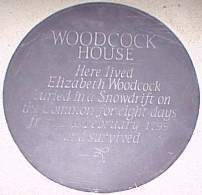
Published on February 02, 2013 01:00
January 30, 2013
A Couple In England - Day Two - Part Two
And so let us tear ourselves away from Beau Brummell's doorstep in Chesterfield Street and return to the top of the pavement and Charles Street and my preoccupation with doorways.
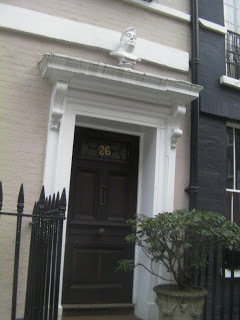
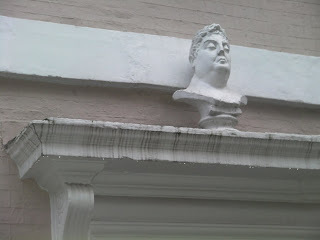
You have to allow that the doorway at No. 26 is a real pip, complete with a plaster bust above the entranceway. Neither Hibbert nor Google have enlightened me thus far, so if anyone knows more about this house, please let me know. Let us proceed . . . . .
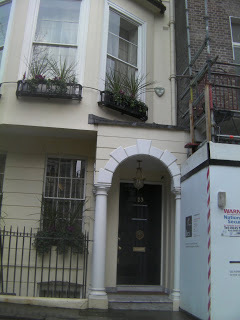
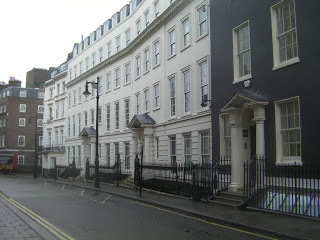
And wander aimlessly through the deserted streets until we find ourselves at this interesting building at the entrance to Hays Mews.
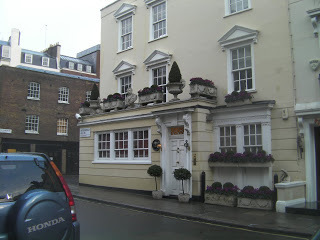
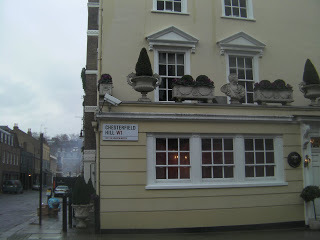
Look . . . . another bust. . . . . I am just now noticing that there was a plaque beside the door. I know I didn't notice it when I was standing there, or I'd have gone up and read it. Now I'm left to wonder, as are you, what this building houses. Sorry, old thing, wasn't thinking . . . . .
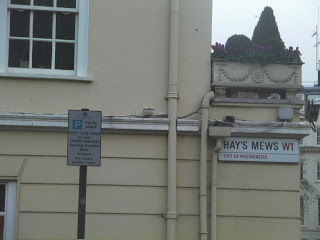
Let's make a right into Hays Mews, shall we?
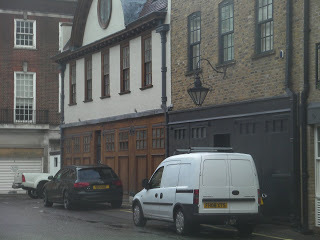
This area was laid out circa 1750 to provide stables and coachhouses for the houses in Berkeley Square and adjacent streets. Architecturally, not much has changed, thank goodness, although there are now cars parked on the street, rather than a jaunty cabriolet.
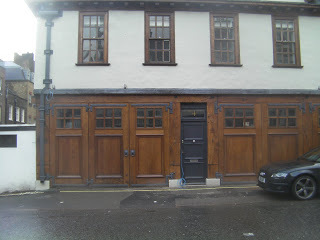
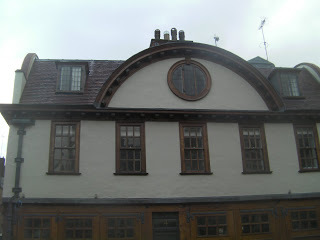
As I've already divulged the contents of my pockets, you know that I had no map with me and, truly, from this point on I simply wandered the streets as the whim took me, so I don't have detailed descriptions of where some of the following photos were taken.
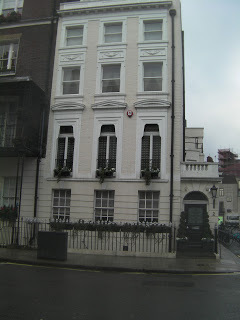
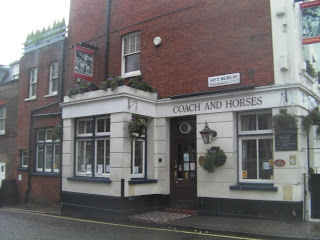
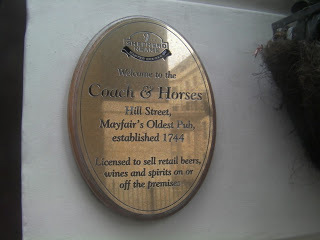
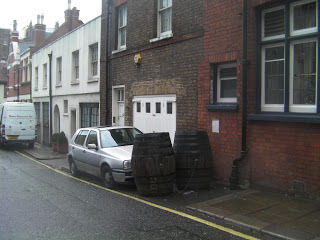
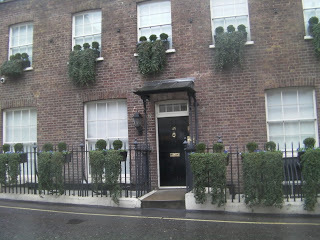
I wound up back at Charles Street, below, and still had the streets all to myself. I did warn you that I was oddly pre-occupied with house fronts and doorways, didn't I?
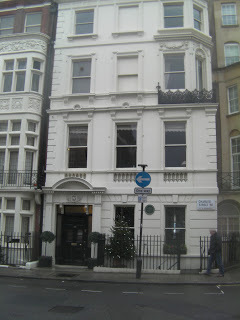
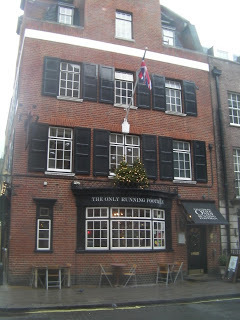
The Only Running Footman, at the corner of Hays Mews and Charles Street. Now an upmarket restaurant, for centuries, it was known as the I Am The Only Running Footman pub, frequented by servants from the houses in the area.
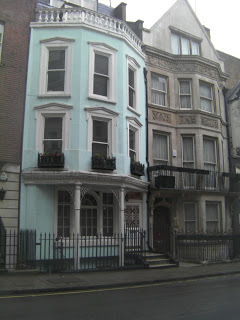
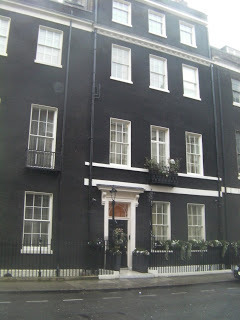
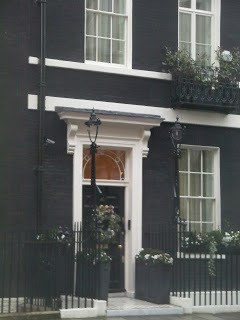
I'll leave you here, in Clarges Mews, for a bit until the next installment. I hope you've enjoyed our Mayfair stroll half as much as I did.
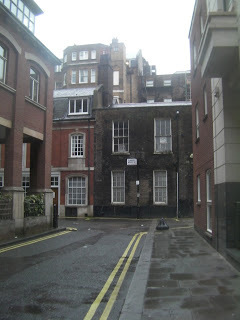
Part Three Coming Soon . . . . . . .
Published on January 30, 2013 00:00
January 28, 2013
Two Hundred Years of Pride and Prejudice
Two Hundred Years of Pride and Prejudice
On January 27, 1813, a novel in three volumes was published in London by The Author of Sense and Sensibility.
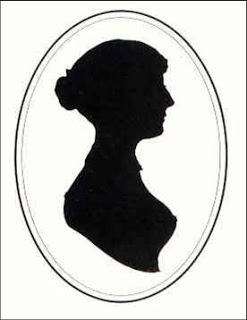
The title Pride and Prejudice may have come from a paragraph in one of the novels of Fanny Burney, Cecilia (1782).
“…if to PRIDE and PREJUDICE you owe your miseries, so wonderfully is good and evil balanced, that to PRIDE and PREJUDICE you will also owe their termination.”
Austen admired Burney's work, and J. Austen is listed as one of the subscribers to Burney's novel Camilla, published in 1796
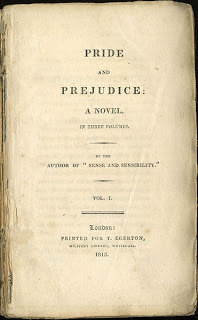
Austen received £110 for the novel's copyright from Publisher Thomas Egerton, who subsequently made a handsome profit from several editions of Pride and Prejudice. The novel has been in the pubic domain for many decades and is estimated to have sold over 20 million copies worldwide, not to mention many adaptations for the stage and screen. In almost all listings of the best and/or most beloved novels, Pride and Prejudice tops all others -- or comes very close.
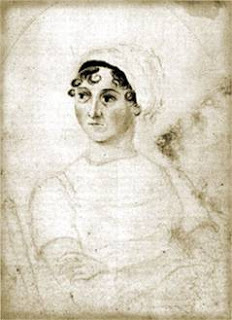 Pride and Prejudice was first drafted as First Impressions in 1796 and 1797 when Jane Austen was about 21 years of age. She had spent her childhood in a lively family, often entertaining her parents, brothers, her sister Cassandra, with her sometimes silly and sometimes witty stories. This year the 200th anniversary of Pride and Prejudice is being observed worldwide in all imaginable ways. In the next few months, we will discuss a few of them now and then. One of the most-looked-forward-to books is The Cambridge Companion to Pride ad Prejudice, edited by Janet Todd.. This much-anticipated volume will be available in April.
Pride and Prejudice was first drafted as First Impressions in 1796 and 1797 when Jane Austen was about 21 years of age. She had spent her childhood in a lively family, often entertaining her parents, brothers, her sister Cassandra, with her sometimes silly and sometimes witty stories. This year the 200th anniversary of Pride and Prejudice is being observed worldwide in all imaginable ways. In the next few months, we will discuss a few of them now and then. One of the most-looked-forward-to books is The Cambridge Companion to Pride ad Prejudice, edited by Janet Todd.. This much-anticipated volume will be available in April.
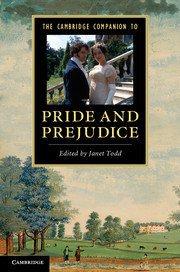 For more information on this volume, click here.
For more information on this volume, click here.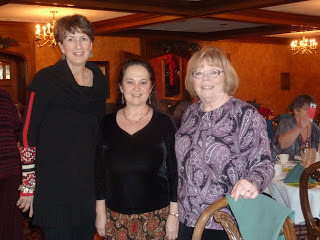 l-r, Liz Philosophos Cooper, JASNA-WI outgoing regional coordinator; UW Professor Emily Auerbach; and current regional coordinator Judy Beineat the 2012 Jane Austen Birthday Celebration, December 15, in Milwaukee, WI
l-r, Liz Philosophos Cooper, JASNA-WI outgoing regional coordinator; UW Professor Emily Auerbach; and current regional coordinator Judy Beineat the 2012 Jane Austen Birthday Celebration, December 15, in Milwaukee, WILast December, Professor Emily Auerbach of the University of Wisconsin presented a preview of her chapter of the Cambridge Companion at the JASNA-WI celebration of Jane Austen's Birthday.
Dr. Auerbach, who is the author of Searching for Jane Austen and teaches Austen's works to students of many ages and backgrounds, in the classroom and on radio, has written the Cambridge Companion Chapter on "Pride and Proliferation." She admitted that any discussion of the many sequels, prequels, continuations, adaptations, and mash-ups would be immediately outdated by new offerings almost every week.
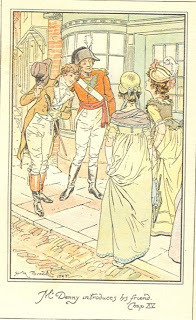
Some books combine characters from some or all of Austen’s novels. Zombies, vampires and werewolves have invaded some versions of Meryton. Others are set in new time periods, even into the future, and in new locations, from Boca Raton to Mumbai.
Particularly popular have been further stories of the Bennet girls, Anne de Bourgh and especially Georgiana Darcy who alone has been married innumerable times in fan fiction. The fates of unborn children of the Darcys, Bingleys, Collinses and many more characters are imagined.
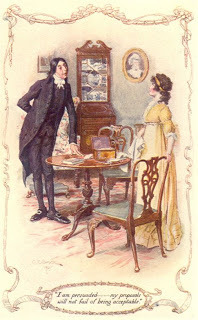 All of this attention, Auerbach tells us, confirms Austen as a full-fledged BRAND, in the 21st century sense of the word. But even for the most devoted Janeite, this bewildering proliferation of tales also confirms our incurable addition to Jane Austen and her universal characters who transcend all categories to prove the power of her sparkling novel. Read on!
All of this attention, Auerbach tells us, confirms Austen as a full-fledged BRAND, in the 21st century sense of the word. But even for the most devoted Janeite, this bewildering proliferation of tales also confirms our incurable addition to Jane Austen and her universal characters who transcend all categories to prove the power of her sparkling novel. Read on!
Published on January 28, 2013 01:00
January 25, 2013
A Couple In England - Day Two - Part One
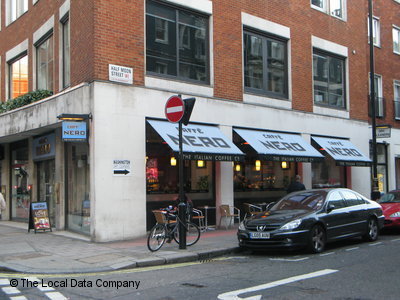
I awoke on Thursday way before the Husband to the realization that I was in London. It was a bit after 8 a.m., but the room was still dark as I climbed out of bed and crept to the bathroom. A short time later, I emerged to find Hubby still sleeping. And London still awaiting me outside. Stealthily, I rummaged around in drawers and suitcases until I found something to wear on the top and something to wear on the bottom. As to what these two garments consisted of I could not have cared less. I donned socks, hoping they were mine and not the Husbands, pulled on my boots, scarf and coat and dropped the room key, money, cigs and lighter and my camera into the coat pockets and crept like a cat burglar out of the door. Emerging from the hotel, I found that it was overcast and drizzling. Undaunted, I grinned my way up the street to Caffe Nero, where I got a medium mocha and took it outside to one of the tables. I sat down, lit up and sipped - God was good and all was right in my world.

The Church of Christ the Scientist is just across Curzon Street, and beside that are C.F. Trumper, Men's Hairdressers
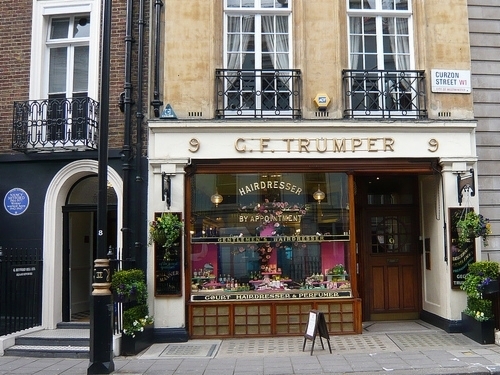
and just to the left of that, G. Heywood Hill Ltd. booksellers.

Of course, neither was open at that early hour, so I took myself off on my long anticipated Mayfair stroll. You'll recall that all I'd wanted to do since yesterday was to walk the streets and poke about at my leisure so, which I did. And found my interest focusing, for some odd reason, on doorways. Here we go . . . . . . .
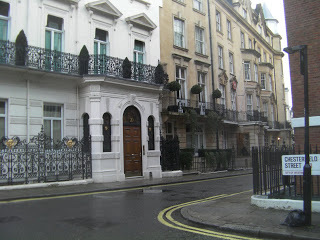
Let's pay homage to the Beau first, shall we? It's only fitting. Taking a right onto Queen Street, we stroll up to the top and make a left onto Charles Street, keeping on until we come to the corner of Chesterfield Street, where Beau Brummell lived. Before we turn in, though, take in the door across the street. And the elaborate railings. And the shrubbery on the terrace. And the pediments.
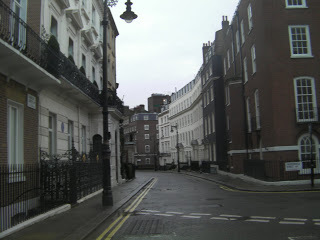
Now look back down the street, at the way we just came. See the street lights, the gentle curve of the street, the wet roads, the grey skies. Not another soul in sight . . . . London in the morning . . . . joy!
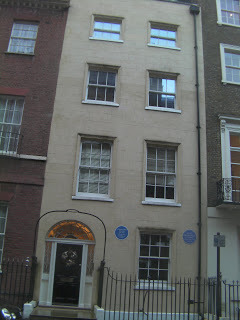
And midway down Chesterfield Street, on the left, we find Brummell's house at No. 4. Let us linger here a moment in the drizzle and contemplate this particular doorway, shall we? Just imagine the visitors who must have come and gone through that door, with its elegant side and fan lights. Visitors aside, just imagine Brummell himself coming and going through that door. Oh, to have the mystery of what he looked like solved at long last! Did he look like this . . . . .
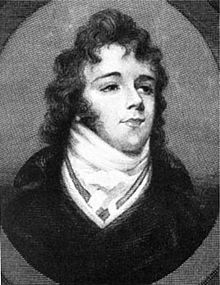
or more like this "I've just smelled something frightful" rendering?
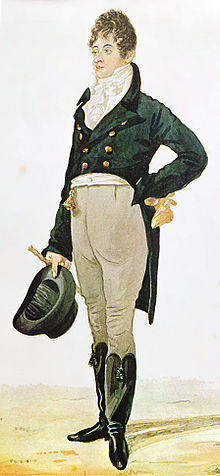
Or possibly an amalgam of both?
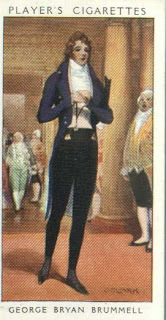
In the early morning quiet, with the streets deserted, it's easy to imagine a carriage drawing round the corner or the sound of a service door closing upon a maid who has just taken in a delivery. A horse may whinny in the distance, someone may shout in the mews two streets away, while the aristocracy sleep warm in their beds, having turned in just a few hours ago after a night of Regency revelry . . . . But back to the house . . . . .
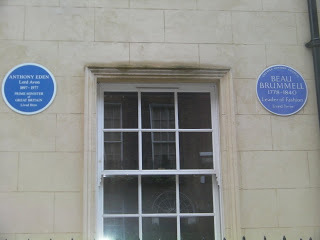
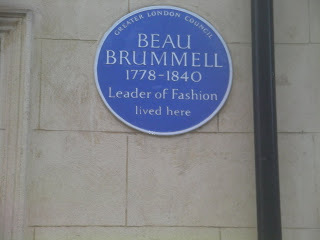 Incidentally, Lord Rosebery lived here, too.
Incidentally, Lord Rosebery lived here, too.
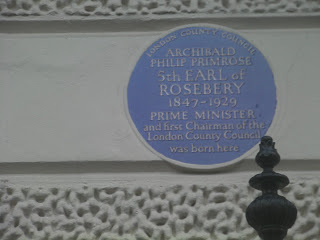
Day Two - Part Two Coming Soon
Published on January 25, 2013 00:30
January 23, 2013
The Adventures of Dr. Syntax, Part 7
The Adventures of Dr. Syntax in Search of the Picturesque Part 7
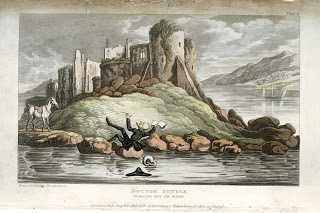 Dr. Syntax Tumbling into the Water
Dr. Syntax Tumbling into the WaterExcerpts from Canto 10
Dr. Syntax, after falling into the lake in Canto 9, becomes sick:
"...It was not Vice that e'er could keep Dear Syntax from refreshing sleep; For no foul thought, no wicked art. In his pure life e'er bore a part. Some ailment dire his slumbers broke. And, ere the sun arose he awoke; When such a tremor o'er him pass'd. He thought that hour would prove his last. His limbs were all besieg'd by pain; He now grew hot, then cold again: His tongue was parch'd, his lips were dry,And, heaving the unbidden sigh.He rang the bell, and call'd for aid.Then groan'd so loud, th' affrighted maid Spread the alarm throughout the house; When straight the landlord and his spouse Made all despatch to do their best And ease the sufferings of their guest. ..."
Eventually Dr. Syntax regains his health and he goes forward on his quest for the picturesque -- which so far has brought him more trouble than anything else.
When, on the fourth, in health renew'd. His anxious journey he pursu'd. In two days more, before his eyes The stately towers of York arise. "But what," said he, "can all this mean? What is yon crowded busy .scene? Ten thousand souls, I do maintain, Are scattered over yonder plain," "Ay, more than that," a man replied. Who trotted briskly by his side, "And if you choose, I’ll be your guide: For sure you will not pass this way. And miss the pleasure of the day: These are the races, to whose sport Nobles and gentry all resort."
Thought Syntax I'll just take a look;
Twill give a subject to my book. ..."
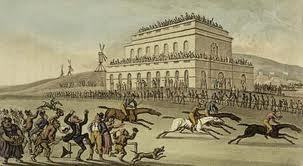
Dr. Syntax loses his money at the Race ground at York
It will come as no surprise to those of you who've followed the good doctor's journey so far that the man who offers his services is less than honest! He tempts Dr Syntax into a wager -- which results in a loss of 20 pounds. Another dilemma for our hero.
What would have been his hapless fate.
In this most unexpected state,
May well be guess'd: but, lo! a friend Fortune was kind enough to send. An honest 'Squire, who smok'd the trick, Appeared well arm'd with oaken stick. And placing many a sturdy blow Upon the shoulders of the foe, "It is with all my soul I beat This vile, this most notorious cheat..." "... Syntax his simple story told ; — The 'Squire, as kind as he was bold. His full protection now affords And cheer'd him both with wine and words. "I love the Clergy from my heart, And always take a parson's part. My father, Doctor, wore the gown; A better man was never known...." There follows another long conversation extolling the virtues of the clergy. Dr. Syntax, in his own opinion, has never had a clerical lliving (job) worthy of his abilities, and he tells that to almost everyone he meets. To a great extent thiese dialogues prepare us for the denouement to come after many more adventures. Excerpts from Canto 11
After a comfortable night with the squire and his wife, over a hearty breakfast Dr. Syntax is addressed by his host: This morning I intend to goTo see the military show. The light dragoons, now quartered here.Will all in grand review appear : They are a regiment of renown. And some great general is come down To see them all, in bright array, Act the fierce battle of the day. If you should like such sights as these, — If Warlike feats your fancy please.We'll to the common take a ride. And I myself will be your guide: So, if you please, within an hour Our nags shall be before the door."...
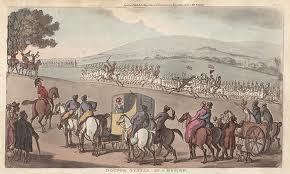 Dr. Syntax at the Review Naturally the good doctor agrees. But just as they are about to leave he receives a letter from his wife, full of loal gossip from home...which concludes as follows:
Dr. Syntax at the Review Naturally the good doctor agrees. But just as they are about to leave he receives a letter from his wife, full of loal gossip from home...which concludes as follows: "...So fare you well, my dearest life,—-And I remain your loving wife."
Postscript.
" But if you fear that you shall come Without a bag of money home, Twere better far that you should take A leap at once into the Lake: I'd rather hear that you were drown'd, Than that you should my hopes confound!"
These tender lines did not impart Much comfort to the Doctor's heart;He therefore thought it would be better To lay aside this pretty letter; Nor suffer its contents to sour The pleasure of the present hour.
The 'Squire now became his guide, So off they trotted, side by side; And, ere they pass'd a mile or two,^ Beheld the scene of the review. The troops drawn up in proud array, An animating sight display ; The well-form'd squadrons wheel around. The standards wave, the trumpets sound..." The horese Grizzle recalls her long-ago days as a war horse by resonding vigorously to the trumpets. But Dr. Syntax manages to survive the charge and eventually returns to his host's home, where the Squire and his Wife entertain him with some songs. Dr. Syntax reciprocates. "Doctor Syntax's Song. I've got a scold of a wife. The plague and storm of my life;O! were she in coal-pit bottom. And all such jades, 'od rot 'em! My cares would then be over. And I should live in clover; With harum scarum, horum scorum, Stew'd prunes for ever! Stew'd prunes for ever! ... The song continues for many verses and concludes: ...By fam'd UIlyssus' stream How oft I fondly dream, When I read in classic pages, Of all the ancient sages; But they were born to die,And so were you and I; With harum scarum, horum scorum,- Stew'd prunes for everl Stew'd prunes for ever ! Thus, with many a pleasant lay, The party clos'd th' exhausted day. More to come...
Published on January 23, 2013 01:00
January 21, 2013
A Couple In England - Day One - Part Two

You may recall that in the first half of my post about our first day in London, I left you at the gates of the In and Out Club on Piccadilly. It was cold, grey and wet; I was chomping at the bit to get into the midst of London, while Hubby was a tad less so. And it was Boxing Day, so that most things were closed.
"What now?" asked the Husband. I looked at him. What, indeed? I hadn't factored in the weather. Or the closings. And speaking of closings, they made not a whit of difference to the hoardes of people walking briskly past us up and down Piccadilly. I looked across the street at the entrance to Green Park. What to do, what to do? Drawing upon my past experiences in London, not to mention the times I'd been over as as a tour guide, I went through my mental Roledex searching for inspiration.
"Come on," I told Hubby, guiding him by the arm towards the crossing light. Over the road we went, then headed towards Apsley House until we got to the bus stop.
"Why are we standing here?" asked Hubby, naturally enough.
"We're waiting for the bus. The Big Red tour bus." I smiled encouragingly, recalling how much fun the Husband had had on the bus the last time we'd been in London together - when we'd ridden all the routes at his suggestion. And taken the Thames River cruise that our tickets also included.
He looked skeptical. "How do you know it stops here?" I pointed at the sign.
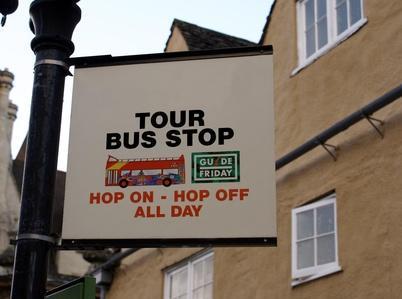
The Husband's face lit with sunshine. "I love the bus tour!" Things were looking up. The next bus showed up sharpish and on we hopped. We paid for our fares and the Hubby took two pair of headphones from the attendant, who encouraged us to head up the stairs to the top level.
"The front of the bus is covered. You won't get wet and you'll have a better view. You don't want to sit down here," he said. Before I could respond, the Husband was all but pushing me up the stairs.
"Hurry up!" he encouraged. "Quick, before the good seats are all taken." He apparently hadn't noticed that the bus was thus far empty. Up we went and had our pick of seats. We chose two right in front of the big windscreen, sat down and plugged in our headphones.
"This is great!"
I smiled back at him. "Happy?"
"Sure. Aren't you?" You bet. The bus pulled away from the curb and the narrative began. "The very first Hard Rock Cafe can be seen on the right . . . . . . . and the large residence coming up just ahead is Apsley House, home to the Dukes of Wellington . . . . . . . the Wellington Arch . . . . . . . . . the Lanesborough Hotel, formerly St. George's Hospital . . . . . . "
Hubby turned to me with a grin and mouthed, "Apsley House!" He pointed at me and mouthed again, "Artie!" I nodded and grinned in return. It was turning out to be a pretty good day after all.
Up Park Lane we went and I spied the Winter Wonderland set up behind Apsley House in Hyde Park. "That's where we're going on Friday night," I told Hubby. Soon we were at Marble Arch, then Oxford Street, which was absolutely crowded with people. Round London we rode - Trafalgar Square, the Duke of York's column . . . . . Westminster Abbey and Big Ben.
[image error]
Past the Embankment, the Tower of London and over Tower Bridge we rode. The narrative directed our attentention to St. George Wharf Tower on the left, which is destined to become the tallest residential building in London and which, unfortunately, would be the scene of a helicopter crash in just two weeks time.

We crossed back over the River and before long we passed Buckingham Palace.
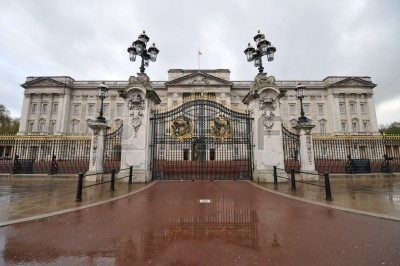
And, once again, Big Ben.
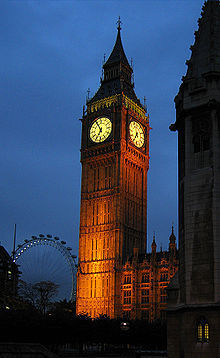
Needless to say, the bus tour was a smashing success. Hubby and I were back on the same page, he was as glad as I to be in London and all seemed right with the world. On that note, we went back to the Green Park Hilton and had dinner in their lovely restaurant and then went upstairs to properly unpack. Climbing into bed a short while later, I kissed the husband and turned out the light secure in the knowledge that tomorrow I'd be waking up in England. On the street where Bertie and Jeeves lived, no less.
Day Two Coming Soon . . . . . . .
Published on January 21, 2013 00:00
January 18, 2013
The Book of Fashionable Life - Collar Days

From The Book of Fashionable Life by A Member of the Royal Household (London, n.d.)
COLLAR DAYS. The Drawing Room is more than usually brilliant on what is emphatically termed "a Collar Day," when the Knights of the Garter, St. Patrick, the Thistle, and indeed of all orders, appear in the presence of the Sovereign in their respective collars and jewels, thereby heightening the rich display of magnificence at all times visible at a Drawing Room. The following is the rota of Collar Days held at the ancient palace of St. James:—January 1st and 6th February 2nd and 24th; March 1st, 17th, and 25th April 23rd and 25th; May 1st, 24th, and 29th June 20th, 24th, 28th, and 29th; July 25th August 24th; September 21st and 29th; October 18th and 28th; November 1st, 5th, and 30th; December 21st and 25th; together with Easter Sunday, Monday, and Tuesday; Ascension Day; Whit Monday and Tuesday; and also Trinity Sunday.
GENERAL REMARKS.
No one should presume to go through the ordeal of presentation without much preliminary training; for, with the best social education and self-possession a person may be utterly at fault in the Queen's drawing room. It is surprising, nevertheless, with how much tact the amiable sex acquire the conventionalities of this grand reunion; while men, who have been admired for ease and grace elsewhere, are at first little removed from gauche. A person of great nerve once informed us that he never felt himself so completely deserted by this quality, as when he was presented to George the Fourth. And still more of gallantry and delicacy are requisite in paying respect to a young, lovely, and accomplished Queen.In kissing Her Majesty's hand, the left arm of the party presented (while kneeling) should be placed under the Queen's right arm, just above the wrist, so as to support it. The utmost grace should be exercised in this act of homage. The kiss should be merely a movement of the lips. Excepting on rare occasions, the Queen always stands to receive the company at the Drawing Room; and we lay the more stress on this, as many have most erroneously asserted that Her Majesty sits during the whole time of reception.One of the most splendid coups d'ceilat the Drawing Room is that afforded in witnessing the vast assemblage of the beauty and elegance of the English aristocracy, whilst waiting in the corridors of St. James's Palace for their carriages. This spacious avenue is generally so crowded as to cause a great delay to those who have attended the Drawing Room; and these titled personages have been known to wait upwards of two hours before theircarriages have been enabled to approach the palace.A very general mistake prevails as to the Dress of gentlemen at drawing rooms. "Silk stockings" are supposed to be indispensable, whereas the Prince, as Field Marshal, wears the high boots; as do also the Duke of Cambridge, and His Grace the Duke of Wellington. Boots, too, are proper for all in military costume.In the quadrangle, facing Marlborough House, is placed the Guard of Honour, furnished by the Life Guards, attended by their splendid band, in their State clothing, with their silver kettle drums (valued at one thousand guineas), the gift of King George III. and George IV. to these gallant regiments. The elegance of the carriages and horses of the Foreign Ministers, Cabinet Ministers, and great Officers of State, in the Ambassadors' Court at St. James's Palace, is proverbial; the ensemble has a striking appearance, and is worthy inspection. We now conclude, having entered elaborately into a review of this most august ceremonial, and with the consciousness that our statements are unimpeachably correct.
Published on January 18, 2013 23:30
January 16, 2013
A Couple In England - Day One - Part One
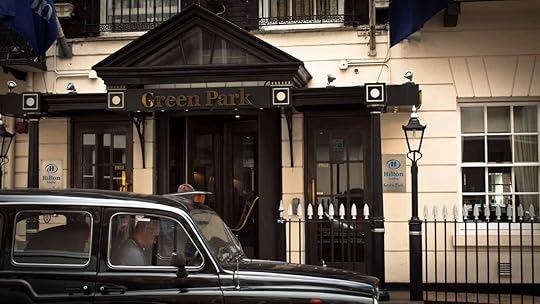
After a fairly uneventful red-eye flight to England on the night of December 25th, we landed at Heathrow next morning and then headed for the Green Park Hilton, our hotel in Half Moon Street. This is a little gem of a place, located in a row of townhouses between Piccadilly and Curzon Street and backing onto Shepard's Market.

Though it was much colder, and wetter, than the Husband or I had anticipated, we were given a warm welcome by the hotel staff and shown to our room, which wasn't badly sized, as London hotel rooms go. Once I'd unpacked (i.e. put the suitcase on the luggage stand and the duffel in a corner) I urged the Hubby to get a move on.
"Come on, let's go," said I.
"Go? It's freezing. Where are we going? You're taking me to Apsley House, aren't you?"
"Apsley House is closed till Saturday. We're going outside. We're in London. In Mayfair."
I should probably tell you now that we spent three days with my family in New Jersey before flying to England. During those three days, my daughter, Brooke, had ample time and opportunity to warn the Husband against Apsley House, home of the Duke of Wellington. Boring is what she called it. Have you ever? She did allow that it was tolerable the first few times I'd taken her there, but that by now she would be grateful to never darken its doorway again.
"Really, Ma, how many times are you going to see it? And why do you always have to drag me along?" Kids.
So Hubby and I venture outside and make it all of a few hundred feet up to Curzon Street, where Hubby spots a Caffe Nero on the corner. I can take a hint as well as the next chap, so inside we go and order an Americano (Hubby) and a mocha (moi). We take them outside and sit at one of the little cafe tables on the pavement. We sip. We light up. And I begin to grin like a Cheshire Cat.
"Is it me, or is this the best coffee you've ever tasted?" asks Hubby.
"It's pretty demmed good. Better than Starbucks, even."
"Why is it so good,do you think?"
"It's not made with regular coffee. It's made with two shots of espresso and boiling water. Strong."
"Is that why you're smiling like that?"
"No. I could be drinking bilge water and I'd still be grinning like this. I'm in London. Finally. London. In England." I looked across the street at the G. Heywood Hill bookshop. "Nancy Mitford worked there."
"Eh?"
"A writer. Sister to the Duchess of Devonshire."
"My good man," said the Husband. His usual response to most of my remarks about British history, as he tends to feel as though I'm lecturing him whenever I attempt to explain what I think are interesting bits of trivia.
"Come on, let's walk around the corner to Shepard's Market," I said, getting my things together.
"Shopping?" the Husband asked.
"Only if you want sheep. It used to be where they sold sheep in London. Now it's full of restaurants and pubs. I just want to go and look."
"Look at what?"
"Shepard's Market," I sighed. "We're in London. We're going to go and look at London. Starting with Shepard's Market." I refrained from explaining that I just wanted to walk the streets, any streets, in order to just be in London. I wanted to soak up the atmosphere. Personally, I didn't care that it was cold, or grey, or wet. All I wanted was to walk aimlessly through Mayfair, to examine every nook and cranny as the whim took me, to peek down service entrances and read blue plaques and imagine Fanny Burney and Beau Brummell having strolled these same streets. Egad, but I'd never missed Victoria so much in all my life.
We walked up Curzon Street and through the alley there that leads to the Market.

Unfortunately, it being Boxing Day, everything but one lone pub was shut up tight.
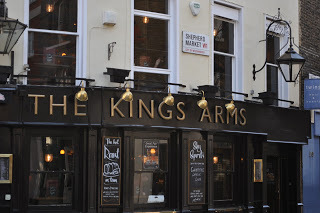
So I walked Hubby down the alley that leads to Piccadilly, where we came out just beside the In and Out Club, now almost obscured by sidings.
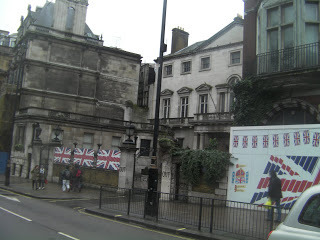
Peeking through the gates, I told the Husband that it was soon to be the most expensive private home in Mayfair, that the people who'd bought it were planning to do a massive remodel and that the building alone sold for one hundred and fifty million pounds.
"It was originally built for the Earl of Egremont," I went on, even though I knew that Hubby might feel he was being lectured. "Then it was sold to the Duke of Cambridge. Adolphus. Brother to George the IV." I was in full spate. "Then it was bought by Lord Palmerston. Who was Prime Minister. Twice." I couldn't have stopped myself if I'd tried. "Finally it was bought by the Naval and Military Club. They painted the words In and Out on the two gates and so the place came to be called the In and Out Club instead."
"My good man."
Part Two Coming Soon . . . . . .
Published on January 16, 2013 16:55
Kristine Hughes's Blog
- Kristine Hughes's profile
- 6 followers
Kristine Hughes isn't a Goodreads Author
(yet),
but they
do have a blog,
so here are some recent posts imported from
their feed.



